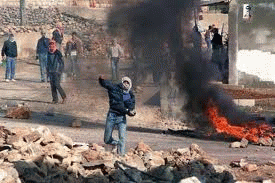(this is the first of two articles on the role of adolescents in mass uprisings)
Much has been made of the role of youth in sparking the so-called "Arab Spring" revolutions in the Middle East and North Africa. The historical significance of the mass insurrections in Tunisia, Egypt, Bahrain and Syria is yet to be determined -- given their failure to bring about genuine political reform. Even Egypt, which received the most media attention, remains under the firm control of the Egyptian military, which has banned strikes and continues to shoot, arrest and torture protestors.
Nevertheless, the willingness of Arab citizens to engage in public protest against some of the most oppressive regimes in the world is a new and significant phenomenon. It highlights the distinction between political and psychological oppression. Psychological repression is a state of wholesale resignation. A population makes no attempt to resist, owing to their belief they will be utterly crushed. Although the Arab populations in the Middle East and North Africa remain politically oppressed, they have made giant strides in overcoming their psychological oppression.
The Role of Youth in Sparking Revolutions
Youth are nearly always the engine behind any movement to throw off psychological oppression. Marxist psychiatrist Wilhelm Reich relates this to the absence of "biological rigidity" that sets in as people age. Older people have an overwhelming drive for "business as usual," which Austrian-born child psychologist Bruno Bettelheim credits for the failure of European Jews to resist the Nazi campaign to enslave and exterminate them (see http://stuartbramhall.aegauthorblogs.com/2011/04/27/pacifism-as-pathology-book-review). Based on my own clinical experience, I would pin it more on the illusion of immortality in children and adolescents -- their inability to grasp the finality of death. It's an inability to fully comprehend this concept that leads to adolescents' reckless disregard for personal safety in their driving, gang banging and other risk taking activities.
The population demographics of the Arab world have special significance in this respect. At present, North Africa and Egypt currently have the highest proportion of young people in the world. Sixty-one percent of the Egyptian population is under 25 (in the US 35% are under 25). This relates mainly to Egypt's low life expectancy (70.3 years, in contrast to 78.7 years in the US) and low numbers in the upper age brackets. Moreover the high rate of unemployment among Egyptians under 25 (25% overall and 30% among collage grads) is credited for an extremely high level of anger and frustration among Egyptian young people.
Lessons from History: Soweto and the Intifada
I have always been fascinated by two other major political movements initiated by teenagers -- the 1976 Soweto uprising in South Africa and the first Palestinian Intifada in 1987. Both were influenced by circumstances I consider even more important than demographics or high youth unemployment. The factor characterizing both the Soweto uprising and the first Intifada is the widespread breakdown of parental authority, which is quite common during periods of social upheaval. This, in turn, leads to precocious development of personal autonomy in teenagers.
I believe both the Soweto uprising and the first Intifada have important implications for political change in the US, given present trends in American families. Over the past two decades, declining earning power has forced most parents (men and women) to work extremely long hours, leaving them have little time or energy for their kids. In many families teenagers are essentially raising themselves -- which has very important implications for generation Z activism.
Lessons from Soweto
The 1976 Soweto uprising in South Africa is widely credited as heralding the start of mass popular resistance to apartheid. While various scholars dispute its significance relative to other resistance activities, the courage and resolve of black teenagers played a pivotal role in inspiring a critical mass of black adults to throw off their psychological oppression and actively resist the brutal apartheid regime. The uprising has always interested me owing to the social conditions -- namely a breakdown in family structure in the black townships -- that made it possible. Marxist psychiatrist Wilhelm Reich wasn't the first -- or the last -- to study the conservatizing influence of the traditional family, especially in authoritarian societies. The breakdown of that influence is often linked to revolutionary political change.
The students involved in the initial Soweto and Alexandria uprisings were, in essence, a generation that raised themselves. Owing to the strict pass laws implemented in the 1950s, many black residents were forced to give up to their homes and property in South African cities and move to black-only townships or Bantustans, where there was no work. The only work open to black men was in remote work camps associated with the gold and diamond mines. While Soweto women worked as domestics and nannies for white families in Johannesburg and only returned to their own children on their days off.
In 1976 Soweto teenagers had a lot in common with homeless teens, third world street children and "young carers" (children who care for parents with physical or mental disabilities or drug and alcohol problems). Forced to look after themselves from an early age, it's typical for these teenagers to mature emotionally at a very early age.
(Note: You can view every article as one long page if you sign up as an Advocate Member, or higher).






